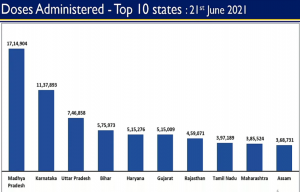Vaccination Boom in Rural and Urban Areas as New Policy Kicks In
Of the 88.9 lakh doses, 46% of women and 53% men were given the vaccines on Monday.
India administered 88.9 lakh vaccine doses on June 21, a landmark beginning to the newest phase of the country’s vaccination policy. As per government officials, 56 lakh doses were administered in the rural regions, while 31.9 lakh doses were administered in the urban areas. Inoculation in the rural area made up 63%, while urban vaccination made up 36% of the total doses. Altogether, over 29 crore vaccine doses have been administered in the country, officials from the Ministry of Health and Family Welfare revealed on Tuesday.
country’s vaccination policy. As per government officials, 56 lakh doses were administered in the rural regions, while 31.9 lakh doses were administered in the urban areas. Inoculation in the rural area made up 63%, while urban vaccination made up 36% of the total doses. Altogether, over 29 crore vaccine doses have been administered in the country, officials from the Ministry of Health and Family Welfare revealed on Tuesday.
“We set a new record on National Yoga Day (June 22) in our mission for national vaccination. It is well beyond the expectation for most of us. This has only been possible due to active, synchronized guidelines between state and central governments,” Rajesh Bhushan, Secretary, MoHFW said.
As per the official, since 63% of the jabs given yesterday were given to citizens in rural areas, it has helped balance out Covid-treatment in line with the country’s population difference. “This shows that it is possible for us to inoculate those in rural areas. More than half of the vaccine doses administered last week were done so in the rural areas,” Dr VK Paul of NITI Aayog said. He further expressed faith in the country’s ability to make the vaccination program more robust in the country’s rural regions, which suffered deeply during the second wave of the Covid-19 pandemic in April-May 2021.
Also Read : How Did Covid-19 Impact Different Age Groups?
The officials also revealed that 92% of the jabs administered on Monday were given in government health facilities, and 46% of women and 53% men were given the vaccine yesterday. “It is essential that we focus on erasing this gender imbalance in inoculation,” Dr Paul added.
Under the new vaccine policy, state governments are being provided the jabs for free by the central government.
However, a close reading of the country’s vaccination program in June has revealed that few state governments administered lower jabs in the run up to June 21st. For instance, in the BJP ruled states of Madhya Pradesh and Uttar Pradesh, the number of vaccine doses administered last week were much lower in comparison to their daily average.
In Madhya Pradesh, the government vaccinated 2.9-4.1 lakh citizens in the first week of June. After administering 5.1 lakh doses on June 14, the number of jabs dropped massively. The next day, on June 15, the state vaccinated only 50,000 citizens. After administering 3.4 lakh doses on June 16, the inoculation drive dropped again. On Sunday, a day before the new policy kicked in, the state vaccinated only 1863 citizens. Both testing and vaccination take place in much lower numbers on Sundays, but this number was much less when compared to jabs given on previous Sundays in the state: 44,578 (June 13) and 1.28 lakh (June 6).
This data is pertinent to note, especially because Madhya Pradesh had the highest number of inoculation on Monday, a whopping 17.14 lakh.
Uttar Pradesh vaccinated the third highest number of citizens on June 21, 7.46 lakh. While this is a commendable figure, it also brings forth the issue of conserving and stocking up vaccine doses prior to the launch of the vaccine policy. On Sunday, the state vaccinated mere 8800 citizens, which is 35% lower than the average number of doses administered on the previous two Sundays.
Covid-19 Variants
Two new variants of the coronavirus, the Delta and Delta Plus, has been a cause of concern for many countries recently. While the Delta variant has been classified as a ‘variant of concern’, the latter still remains in the category of ‘variant of interest’.
Officials revealed that India has identified 22 cases of the Delta Plus variant, of which 16 are located in Maharashtra’s Ratnagiri and Jalgaon. The rest are in Kerala and Madhya Pradesh. As of June 22, the virus has been identified in only 10 countries- India, USA, UK, Portugal, Switzerland, Japan, Poland, Nepal, China, and Russia. The Delta variant of the virus has been identified in 80 countries across the globe.
“We have sent an advisory to the governments of Maharashtra, MP, and Kerala to address the issue. It looks fairly small at present but we don’t want it to assume significant proportions. Both our vaccines, Covaxin and Covishield, have shown resistance towards the variants,” Dr Paul added.
